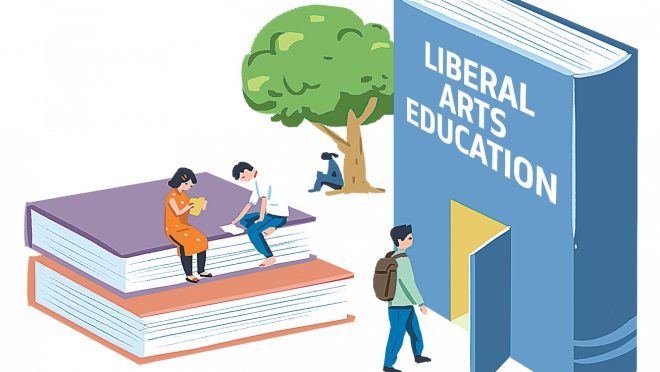Why Bangladeshi universities should consider liberal arts education
In recent years, there has been a growing recognition of the importance of liberal arts education in higher education institutions around the world
Why Bangladeshi universities should consider liberal arts education
In recent years, there has been a growing recognition of the importance of liberal arts education in higher education institutions around the world

In light of the recent university rankings published by Times Higher Education, it’s disappointing to note that no university in our country has made it to the top 500 list. One of the major factors contributing to this concerning trend is our undergraduate subject choice system and curriculum.
In recent years, there has been a growing recognition of the importance of liberal arts education in higher education institutions around the world. Bangladesh, with its rapidly developing economy and expanding higher education sector, should also consider embracing this educational approach.
This approach is very different from the existing one, where your performance on university entrance tests largely determines what you study. But what exactly is this liberal arts education? What’s the current situation in Bangladesh? And why is this change needed?
Understanding liberal arts education
According to Covenant College, United States, ”A liberal arts education is a well-rounded, holistic approach to preparation for life and career. Instead of a sole focus on one specific area or skill, liberal arts schools teach soft skills like research, critical thinking, leadership, teamwork, writing, and communication in addition to specific majors and concentrations.
Liberal arts students benefit from the interconnection between core classes and major classes. Instead of viewing general education classes as a checklist of unrelated subjects to get out of the way before diving into the meat of their major, liberal arts students build a base.
In liberal arts education, the early undergraduate years emphasise exploration. Freshmen and sophomore students take introductory courses, meet advisors, and reflect on their goals. They typically choose a major by the end of their sophomore year.
Prestigious institutions like Harvard, Columbia, Princeton, and other well-known liberal arts colleges in the United States use this strategy.
Bangladesh’s universities currently follow a strict process.Your major is pretty much set by your entrance exam scores. This means you have to choose what you want to study before you’ve had a chance to explore different subjects fully.
Why we should think about liberal arts education
Choosing wisely
Liberal arts education encourages informed major selection by allowing students to explore various courses, aligning their studies with personal interests and career aspirations. Take Mina, for instance, who initially pursued physics but discovered her talent in finance through liberal arts exploration. Her informed career switch led to a successful banking career.
Being flexible
Liberal arts education is all about connecting ideas from different areas, making you a better thinker. This helps you solve problems and adapt to different situations, which is super useful in today’s job market.
Take Raju, for instance. He first thought about being an engineer but found his passion for international relations during his liberal arts journey. Now, he’s a diplomat, bringing a fresh perspective to the field.
Less exam pressure
Right now in Bangladesh, there’s so much pressure on students to ace entrance exams. This can push them to pick majors just because they think it’ll get them a good job. A liberal arts programme would take away some of that pressure, letting students explore their interests freely.
Taking on the civil service job overhype
One significant issue with the current system is that it channels too many students towards civil service jobs due to its limited flexibility in allowing them to major in their desired subjects.That leads to a lot of people competing for a limited number of spots and not pursuing other careers they might be really good at.
Why universities would benefit too
Getting more attention worldwide
Universities that offer liberal arts programmes often get more recognition on the global stage. This can lead to more international students and faculty showing interest, as well as opportunities to work with famous institutions from around the world. Look at Swarthmore College. Its liberal arts education programme attracts students and professors from everywhere, boosting its global reputation.
Boosting research
Encouraging students to learn across different fields can lead to more research and new ideas within universities. When students bring diverse perspectives to the table, it can boost a university’s research and reputation. Think about Princeton University. Their liberal arts and science programme has led to groundbreaking research in lots of different areas.
Creating adaptable graduates
Graduates of liberal arts programmes often have a wide range of skills. This can make a university look good and help their graduates thrive in a fast-changing job market. Graduates from Harvard University’s liberal arts programmes have gone on to do great things in fields like law, business, medicine, and public service.
A path forward
While formal calls for this change have not yet emerged from students or educational scholars in Bangladesh, it is essential to explore the potential advantages of a liberal arts approach.
Whether Bangladesh chooses to adopt this model or not, these discussions are crucial in ensuring that the nation’s educational system remains responsive to the evolving needs of its students and society.
As the global landscape of higher education continues to evolve, Bangladesh stands at a pivotal juncture. It has the opportunity to pioneer innovative approaches that prepare its graduates to excel in an ever-changing world.
By fostering a culture of exploration and interdisciplinary learning, Bangladesh’s universities can nurture a new generation of adaptable, versatile thinkers who will contribute to the nation’s growth and development.


